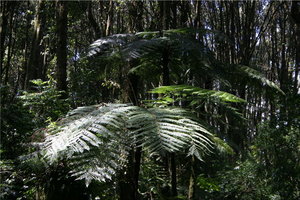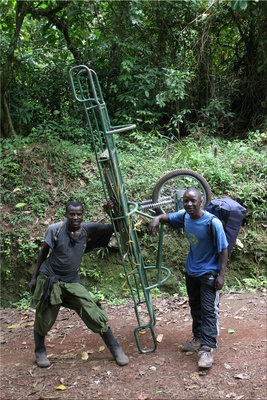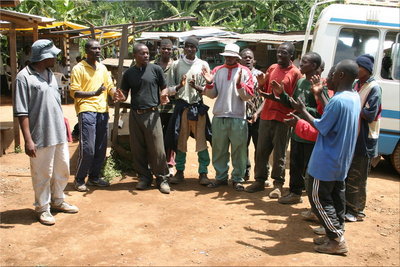
I am inspired to put my voice recorder into hi-fi mode and walk through the camp to record the sound panorama. As I do so, I see the sunlit summit of Kilimanjaro over the trees and go back to get my camera.
Today is the ceremonial handover of the tip and the gifts. We have combined both for Chombo to distribute as appropriate. He knows all the porters and their needs, and who would best benefit from some BIC pens, or chewing gum, or a pair of mitts or a digital watch or any of the other stuff in our accumulated loot. The tip for our crew of 15 people amounts to hundreds of dollars and it is money well spent, since, from what we've heard, it essentially doubles everyone's take-home pay.

|
|
Giant fern in the jungle
|
Breakfast is eaten in the mess tent - the usual menu, with the difference that it already tastes better to me. The lower altitude has restored my appetite and calmed my stomach. We pack up our own tents, rather than leaving this for the porters to do, to ensure that all the pieces are accounted for.
Then we set off, accompanied as on the first day by Shebe. The Mweka camp is right at a boundary where the scrawny trees give way to lush jungle, and so the walk is very beautiful. Many times, we stop to admire giant ferns or sunlit clearings, or listen to the birds singing. There are no mosquitoes to speak of.
The trail continues relentlessly downhill. Yi has an old knee problem that has flared up, and is making her way slowly and painfully. Chombo and Luckas catch up and offer to help - it would be best if Yi just rode on Luckas's shoulders but she'll have none of it (I'd probably be the same in her shoes). The endless downhill is enough to make anyone sore - my calf muscles are complaining too. In total, we will lose about 5500 feet of elevation in 3 hours' walk today.
We are continually passed by groups of porters including our own. Nobody at all is hiking up this trail.
I fall behind so I have quiet to record bird noises (short sample, 362KB MP3). One of my recordings is spoiled by a guy and his guide coming down the trail singing. I strike up a conversation and meet Vinh, a newly minted Ph.D. in microbiology from UC Davis, who among other talents speaks fluent German. We have fun conversing in that language for a while.
Eventually everyone but Yi and Peter has gone ahead and I am hiking with Luckas. It is difficult to make conversation because Luckas knows little English. In other respects he is ready to be a full guide, so I hope he will learn.

|
|
The stretcher carrier guy and Luckas
|
Just before the trail ends I see some women and children working. One of them is skinning a log with a machete. I don't bother with pictures this time, but again it is tempting to tip them something. I'm starting to understand that doing something interesting in view of wealthy tourists can be quite profitable by local standards.
And then we are finished. The large Swiss group is at the trailhead, being treated to grilled sausages, cold cut platters, cake and other wonderful food, and their touring company has large vehicles standing by. Our own company's bus couldn't make it up the last part of the road, which is too rough and steep, and we have to walk another 10 minutes. First though, Chombo hands out the certificates. Five of them say congratulations on summiting Kilimanjaro. Mine is the "nice try" version that congratulates the recipient for reaching Gillman's Point on the rim (actually I reached Stella point, which is higher, but Gillman's Point is the early turnaround on the Marangu route).
On the walk down, we pass very nice banana plantations, with the space between the banana trees filled in either with coffee or with corn. Children peek out between the stalks, and some follow us on the road.
Local commercial interests try to sell us knives, banana leaf pictures, bracelets and carvings. One of them tells me confidentially that he will take dollars or sh*t (Is he serious our a police plant? I don't care because I don't have any. Perhaps the leftover supplies of many climbers include a little weed). Bags are loaded onto the bus, speeches are made, the Kilimanjaro song is sung (I fail to record it because I didn't get the recorder ready in time), and then everyone gets on the bus and we're off.
Around 5500 feet, the landscape is lush and green and the small plantations look healthy. As you descend, the landscape becomes drier, and more conventional large-scale farms (mostly coffee) pass by. Children watching the bus go by shout "Chocolate?" I don't have any, but have some leftover hard candies (Werther's and Campinos) so I toss a few of those. I am later criticized for being culturally insensitive for doing this and stop.

|
|
Goodbye ceremonies: Porters, cook and guides singing the Kilimanjaro song
|
Back at the Springlands Hotel, the first order of business is our first showers in 8 days. First we have to wait for the hot water heater to warm up. Though otherwise cleaned up now, I have badly sunburned my nose and lips, which are starting to crack and peel. Otherwise I'm fine.
We fill out a feedback form for the touring company, recharge digital camera batteries, fail to use the internet (because the connection is down -- half the computers are out of service anyway, these people need a good geek) and hang around drinking pop until dinner time. I wash two pairs of rad pants and a t-shirt in the sink with hand soap and hang them up to dry (this is the only laundry I do on the whole trip).
Peter spends time with the Zara travel agent and comes up with perfectly timed flights to use up all our unplanned time at the end of the trip by going to Zanzibar. But the flights are expensive: US $328 per person, from Arusha airport to Zanzibar and then from there to Nairobi to meet our flight home. Can this possibly be worth just under 3 days in Zanzibar? Especially for me, who has not been looking forward to going there for the last six months, and knows essentially nothing about the island? Pu doesn't think so, and makes other plans. I think about it and, well, you only live once, when is the next time I'm likely to be here and anyway we'll get to experience a real African airline. So I sign on.
Dinnertime rolls around. I'm not too enthusiastic about today's menu, which is lamb and fish. But as soon as I taste some, my long-absent appetite kicks into high gear and I devour two plates full of food, and it all tastes great. We expected a visit from Chombo in the evening, but instead Shebe and another guide come, to explain that Chombo had "an emergency" and is going right back up the mountain tomorrow morning. I give Shebe the two paperback novels that I brought, because he can use reading material to improve his English skills. I notice that these guys need visitor badges to get inside the hotel grounds.